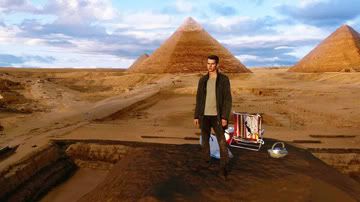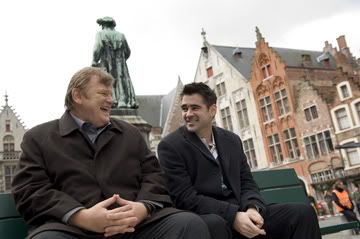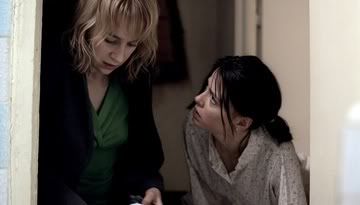Jumper (2008)


For a minute there, I actually thought that "Jumper" could've been good. I mean, hey, the trailers looked pretty explosive, fun, and action-packed. Well, it turns out that this is a movie where you might as well watch the trailers over and over again because they're about a billion times better than the real thing. Just imagine the movie you would want to see with this premise, and then don't go see the movie. Let's just say this: After about 30 minutes, I was ready to pack up my stuff and leave. The only thing this movie doesn't suffer from is a lack of attractive leads. Yeah, that's right.
Director Doug Liman has gone downhill since "The Bourne Identity" with the star-studded but hollow "Mr. and Mrs. Smith" and has officially fallen flat on his face with this terrible sci-fi piece of schlock. The idea was adapted from Steven Gould's novel about a group of people called Jumpers who are pursued by another group called Paladins. The Jumpers have the ability to, let's say, teleport from Ann Arbor to Japan instantaneously. And these Paladins want them dead. Why? No explanation. Are you lost yet? Yeah, me too. With so many plot holes to keep up with, by the middle of it all, you may find yourself wishing you could teleport, too, only to get as far away from the screen in front of you as possible.
David (Hayden Christensen) discovers his ability to "jump" when he needs to escape his home in Ann Arbor. Yes, that's right, our Ann Arbor. Mentions of Plymouth and Detroit were on the top of the list of entertaining moments in the film. Anyway, David needs to escape, so he does and officially puts his teleporting skill to use. He robs banks without opening any doors, sunbathes on top of the Sphinx, hangs out on the minute hand of Big Ben, picks up women, sleeps with them, and literally disappears, and all does so without any consequences. That is, until Mace Windu, or, excuse me, Roland (Samuel L. Jackson) shows up with his electricity light stick thing wanting to murder yet another Jumper who somehow irritates him to no end because he's pretending to be God, or something. Nobody messes with Sammy L's religion.
Hayden Christensen hasn't been able to act since Star Wars: Episode III, and everybody knows this. He's as stale as ever here, and you actually begin hating his character quite quickly. I mean, this guy is self-centered, wears annoying V-neck shirts, and expects everybody to love him. I'm sorry, but I got tired of being forced to root for this unlikeable jerk. His girlfriend, Millie (Rachel Bison), who David drags around with him, screws, and then inevitably saves, is understandably frustrated and conveys perfectly how the audience is most likely feeling. I knew at least I was relating well with her exasperated tones. And Samuel Jackson yet again plays his bad ass self and looks ridiculous with his stupid white hair. And he doesn't even drop an f-bomb like he usually does. The actual f-bomb dropper turns out to be the movie's only saving grace; that is, a fellow Jumper, Griffin (Jamie Bell), who tries to save David. The charismatic Jamie Bell provides a much-needed burst of life.
Even Diane Lane uselessly shows up every now and then as David's mother who is, wait for it, a Paladin! Oh, my. Between this and "Untraceable," poor Diane Lane isn't making intelligent choices. Anyway, within periods of inane dialogue, there are hyper active action sequences that are dizzying to watch thanks to surprisingly cheesy special effects and a laughably absurd chase sequence near the movie's climax. "Jumper" certainly takes its viewers to many locations but goes absolutely nowhere while doing so. And at an incomprehensible 88-minutes, the ridiculous punishment couldn't be over soon enough.
Close to the end of the movie, there's a scene of Samuel Jackson peering off the edge of a cliff where David just teleported to escape. Jackson has a sly smirk on his face that says basically two things: "Thank God filming for this movie is finally over with" and "Oh, Hayden, I'll get you next time...in the sequel!" I think the emphasis, however, is on the latter statement because, supposedly, this installment is just the beginning as "Jumper" is slated to be some sort of trilogy. I honestly cannot imagine one more catastrophe like this to be created, let alone two.









